june-top.html
1713 Jonathan Swift became Dean of St Patrick’s Cathedral, Dublin on this day 13 June.
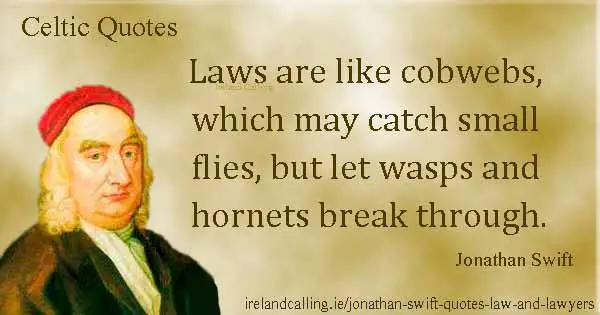
Read more Jonathan Swift quotes
* * *
1798 The Battle of Ballynahinch continued from the previous night. As soon as dawn broke on the morning of 13th June in 1798, British soldiers attacked the United Irishmen rebels in the town of Ballynahinch.
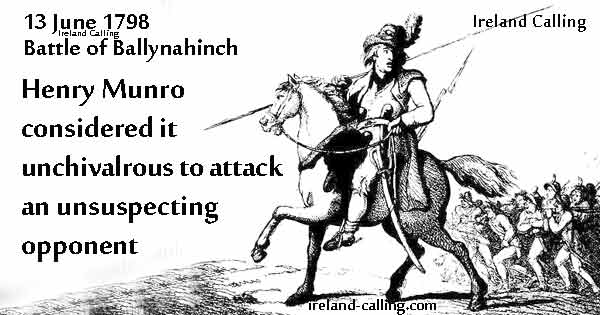
One of the victims of the post-battle massacre was teenage peasant girl Betsy Gray, who was killed along with her brother and her lover. Gray had her hand cut off before being decapitated and has gone down in Irish folklore as one of the martyrs of the 1798 Rebellion. The GAA competition, the Betsy Gray Cup, was named in her honour and is played for in Ulster to this day.

Read about the Battle of Ballynahinch and misguided chivalry of leader Munro
Discover the background of the 1978 Rebellion here;
* * *
1865 William Butler Yeats was born in Dublin on this day in 1865. He grew up to be one of the most respected and admired writers of his generation, and a key figure in Ireland’s history.
Yeats was an Irish nationalist, who campaigned for an independent republic. However, rather than turn to military action to achieve this as many rebels did in the Easter Rising of 1916, Yeats expressed his feelings through his poems.
 Discover the background to the poem and what it means.
Discover the background to the poem and what it means.
He wrote countless brilliant poems during his life, many of which featured on the list of Ireland’s 100 favourite poems as voted for by readers of the Irish Times in 1999. One of which Easter 1916, was written in the aftermath of the failed rebellion by the Irish nationalists.
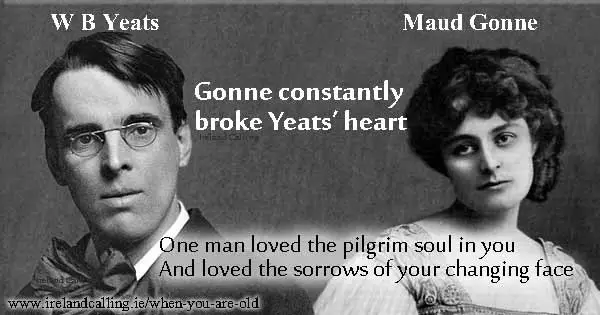
Many of Yeats’ poems were inspired by his love for the beautiful actress and fellow Irish nationalist Maud Gonne. Yeats loved Gonne for many years and repeatedly proposed to her without success. His poem When You Are Old was a warning to Gonne that men would no longer be interested in her once she had lost her youthful beauty.

He Wishes for the Cloths of Heaven was another poem Yeats wrote with Gonne in mind. The final line; “Tread softly because you tread on my dreams.” is famous as he asks Gonne not to hurt him again with her rejections.
Yeats won a Nobel Prize for Literature during his career and is still considered to be one of the greatest writers ever to come from Ireland.
Twenty five of Ireland’s 100 favourite poems are by Yeats.
Click here to read more about WB Yeats
Click here to read about other great Irish writers
Click here to read some of the best quotes from WB Yeats
Click here to read great quotes from other important Irish figures
Click here to read more about the love affair between WB Yeats and Maud Gonne
Click here to read about other Irish love stories
Click here to read more about the Easter Rising
Click here to read the poem Easter, 1916
Click here to read the poem When You Are Old
Click here to read the poem He Wishes for the Cloths of Heaven
Click here to read any of Ireland’s 100 favourite poems (25 by Yeats)
* * *
1951 Éamon de Valera regained the position of Taoiseach on this day in 1951. He had lost the election three years earlier, after losing popularity with much of the Irish public by offering a message of condolence to the German Minister in Dublin after the death of Adolf Hitler.
He regained power in the 1951 election, but his political career was nearing its end, and he only remained in power for three more years. By then, de Valera was 75 and took up the less demanding position of President of Ireland.

See a selection o de Valera’s quotes here
* * *
1978 Happy birthday to Brian Dowling, born in County Kildare on this day in 1978. He rose to fame in 2001, when he won the second series of the British version of reality television programme Big Brother. He went on to appear as a guest and work as a presenter on various entertainment shows, including series 10 and 11 of Big Brother. Dowling was also the first openly gay presenter of a children’s programme when he worked on SMTV in 2002.
* * *
1988 Happy Molly Malone Day! Today, 13 June, has officially been known as Molly Malone Day since 1988. Molly Malone is a legendary figure in Dublin’s history. A hawker by day, selling cockles and mussels, and a prostitute by night.
Molly Malone reportedly died of a fever on 13 June, although there are various theories as to when she lived. One suggests she was from the 1700s, another that she lived as late as 1886. Records don’t suggest that either theory is accurate. There have obviously been many people named Molly Malone living in Dublin throughout history, though there is no strong evidence to link any one individual to the legendary figure.
Despite this, Molly Malone has a statue in Grafton Street, Dublin, was honoured by the Mayor of Dublin with her own day, and has a classic Irish folk song named in her memory. The song Molly Malone is an unofficial anthem of Dublin city and is a must in the repertoire of Irish folk musicians including, of course, The Dubliners.
Click here to read about other attractions in Dublin
Click here to read more about the history of the song Molly Malone
Click here to get the lyrics and chords for the song Molly Malone
Click here to watch the Dubliners perform Molly Malone
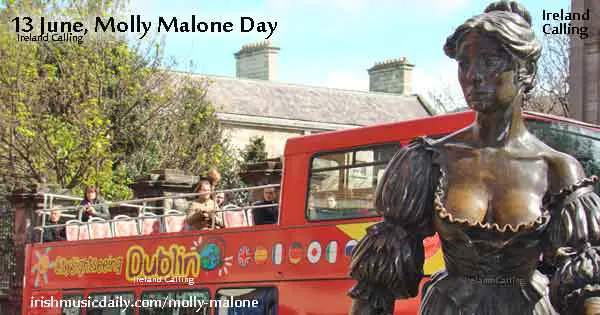
* * *
2000 On this day in 2000, the original manuscript of James Joyce’s Ulysses was put on display at the Chester Beatty Library in Dublin.
Ulysses is divided into 18 chapters (episodes). The book appears unstructured and random.
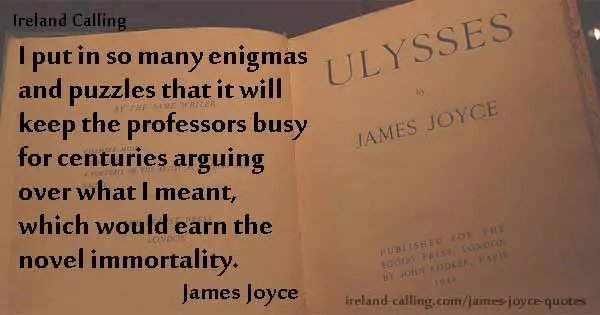
Joyce said that he had “put in so many enigmas and puzzles that it will keep the professors busy for centuries arguing over what I meant, which would earn the novel immortality”.
The novel is Joyce’s most famous work, and has been adapted to for performances on the stage and the big screen countless times since it was first published.
june-bottom.html